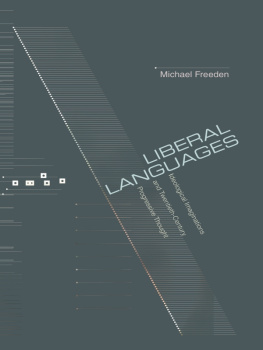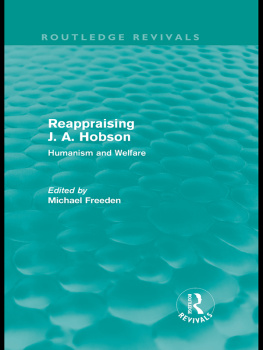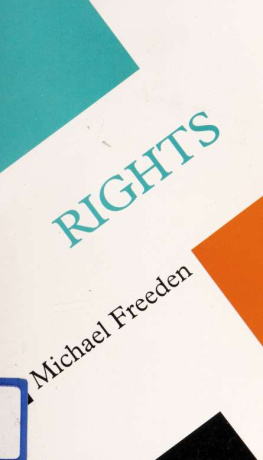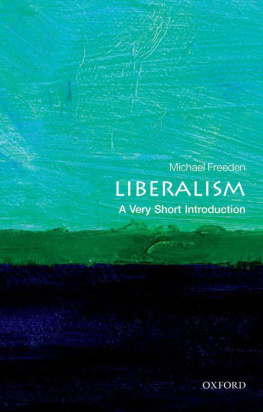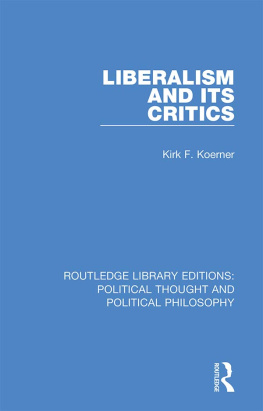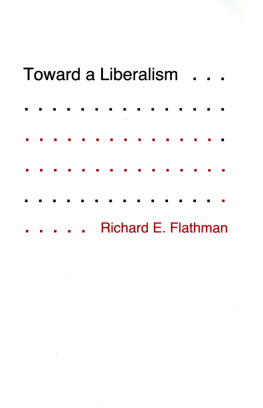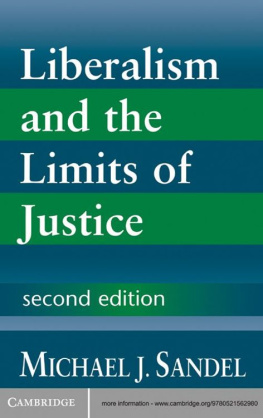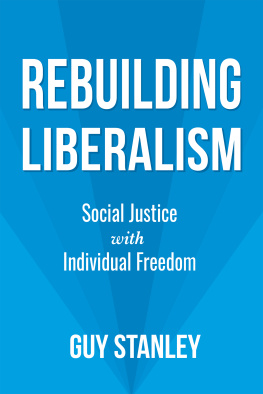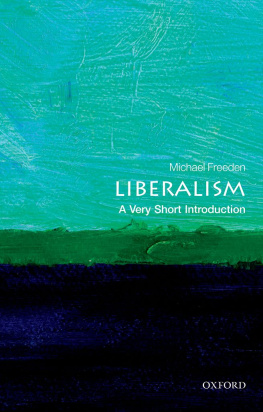Liberal Languages
LIBERAL LANGUAGES
Ideological Imaginations
and Twentieth-Century
Progressive Thought
Michael Freeden
PRINCETON UNIVERSITY PRESS
PRINCETON AND OXFORD
Copyright 2005 by Princeton University Press
Published by Princeton University Press, 41 William Street,
Princeton, New Jersey 08540
In the United Kingdom: Princeton University Press, 3 Market Place,
Woodstock, Oxfordshire OX20 1SY
All Rights Reserved
Library of Congress Cataloging-in-Publication Data
Freeden, Michael.
Liberal languages : ideological imaginations and twentieth-century
progressive thought / Michael Freeden
p. cm.
Includes bibliographical references and index
eISBN: 978-1-40082-635-3
1. Liberalism. 2. Political scienceHistory20th century. 3. Ideology. I. Title.
JC574.F595 2005
320.51'09''04dc22 2004041463
British Library Cataloging in Publication Data is available
This book has been composed in Sabon
Printed on acid-free paper.
pup.princeton.edu
Printed in the United States of America
10 9 8 7 6 5 4 3 2 1
To the memory of my mother, Dr. Marianne Freeden,and of my father, Dr. Herbert Freeden
Contents
Acknowledgments
THIS COLLECTION IS the product of many years of reading, talking, listening and thinking about both liberalism and ideology with colleagues, authors past and present, students, friends and family. H.-G. Gadamer famously wrote about the conversation that we ourselves are, and I can only concur. Specific thanks to Ian Malcolm of Princeton University Press for his support and encouragement.
I would like to express my thanks for permission to reprint articles and chapters previously published in the following books or journals:
Twentieth-Century Liberal Thought: Development or Transformation? in M. Evans, ed., The Edinburgh Companion to Contemporary Liberalism (Edinburgh University Press, 2001).
Liberal Community: An Essay in Retrieval, in A. Simhony and D. Weinstein, eds., The New Liberalism: Reconciling Liberty and Community (Cambridge University Press, 2001).
The Concept of Poverty and Progressive Liberalism was published in French in F.-X. Merrien, ed., Facela Pauvret (Paris: Les ditions de lAtelier, 1994).
The seeds of Layers of Legitimacy: Consent, Dissent and Power in Lef-Liberal Languages were planted in an article entitled Liberalismo, Potere ed lites in Gran Bretagna 18901930, Ricerche di Storia Politica 7 (1992). The chapter loosely builds on that article and on a lecture given at the University of Bologna in 2002 to develop a different set of arguments.
J. A. Hobson as a Political Theorist, in J. Pheby, ed., J. A. Hobsonafter Fifty Years: Freethinker of the Social Sciences (Macmillan, London, 1994), reproduced with permission of Palgrave Macmillan.
Hobsons Evolving Conceptions of Human Nature, in M. Freeden, ed., Reappraising J.A. Hobson: Humanism and Welfare (Unwin Hyman, London, 1990), reproduced with permission of HarperCollins Publishers Ltd., (c) 1990 Michael Freeden.
Eugenics and Progressive Thought: A Study in Ideological Affinity, HistoricalJournal 22 (1979).
True Blood or False Genealogy: New Labour and British Social Democratic Thought, in A. Gamble and T. Wright, eds., The New Social Democracy (Blackwell, 1999).
The Ideology of New Labour, Political Quarterly 70 (1999): 4251. Is Nationalism a Distinct Ideology? Political Studies 46 (1998).
Political Theory and the Environment: Nurturing a Sustainable Relationship, in A. Light and A. de-Shalit, eds., Moral and Political Reasoningin Environmental Practice (M.I.T. Press, 2003).
Practising Ideology and Ideological Practices in Political Ideas and Political Action, ed. R. Barker, special issue, Political Studies 48 (2000).
Irene, Jonathan, and Daniella have ensured that my labours are labours of love.
PART ONE
INTRODUCTION
LIBERALISM RESARTUS
The term liberalism has always enjoyed a separate existence away from the constricting, formal, and austere world of political concepts and theories. To be liberal evokes generosity, tolerance, compassion, being fired up with the promise of open, unbounded spaces within which the free play of personality can be aired. Yet the clues to liberalisms political nature are not hard to detect. Generosity suggests the dispensing of bounties beyond the call of dutyto prioritise justice as the first liberal virtue is unnecessarily reductionist. Tolerance suggests a flexibility, a movement, a diversityof ideas, of language, and of conceptual contentthat sets liberalism aside from most of its ideological rivals, whose declared aspiration is to finalise their control over the political imagination. Compassion suggests an empathy, a sociability, an altruism, that pays homage to the human networks in which individualism is integrally and beneficially enmeshed, as well as an ardent desire to alleviate human suffering. And openness suggests that the permutations of human conduct and thought are unfathomable and wonderfully unpredictable. Lest we forget, those are liberalisms most remarkable qualities.
Just over a century ago, something significant happened to liberalism that brought those qualities into particular prominence. It underwent a series of transformations that changed the nature of Western politics, while altering the internal balance of liberal political thought itself. Many factors contributed to that change. Among those were the growing reach of democratised politics; the (re)discovery of social relations as partly constituting the individual; the popularisation of evolutionary theory grafted on to theories of progress; a new attentiveness to the psychology of human vitality; the identification of additional barriers to human action and development that required novel conceptions of liberty; and, not least, a reconceptualisation of politics as a responsible, responsive, and facilitating communal activity. That process occurred in a number of cultural locations: in France, in the Antipodes, in the United States, in Italy. But above all it took place in Britain, and Britainthen still a net exporter of political ideaspersevered in its nineteenth-century role as the leading producer and disseminator of cutting-edge liberal theory and of the practices that accompanied such thinking. The chapters in this first section are intended both to illustrate the potential that is always available in liberal theory and ideology, and to emphasise the actual importance and impact of a body of ideas that grew over time and across space.
That British movement of ideas, known as the new liberalism, was no chimera or historical oddity, no flash in the pan, no geographical eccentricity. Rather, it teased out of liberalism implicit and underplayed features that created an ideological turn. This juncture lies at the basis of the welfare stateprobably the most important domestic institutional achievement of Western political systems in the twentieth century. Two of the central figures of the new liberalism, Leonard Trelawny Hobhouse and John Atkinson Hobsonwho figure prominently in the following pagesdeserve that salience because they epitomise that ideological turn in their fecund writings and in their innovative methodology. We can, indeed, employ them to unlock much of the liberal potential that has become hidden, or has been overlooked, in many of the philosophical liberal discourses that dominated the period between the 1970s and the 1990s. As befits a broadly based intellectual tradition, the two British thinkers are equally important for who they were as for the trend they so brilliantly and efficiently symbolised, for their ability to optimise liberalisms humanist promise, and for the distinctive liberal language they developed. Nonetheless, the story of the new, progressive liberalism of the twentieth century is a far more extensive and subtle one, involving individuals, groups, and institutions that through their synergies moulded an intricate and pervasive modern Weltanschauung, employing a range of liberal languages. And it is a story that should on no account be displaced by the political remoteness, specialised interests, and hypothetical thought-experiments characteristic of recent academic liberal debates.
Next page
